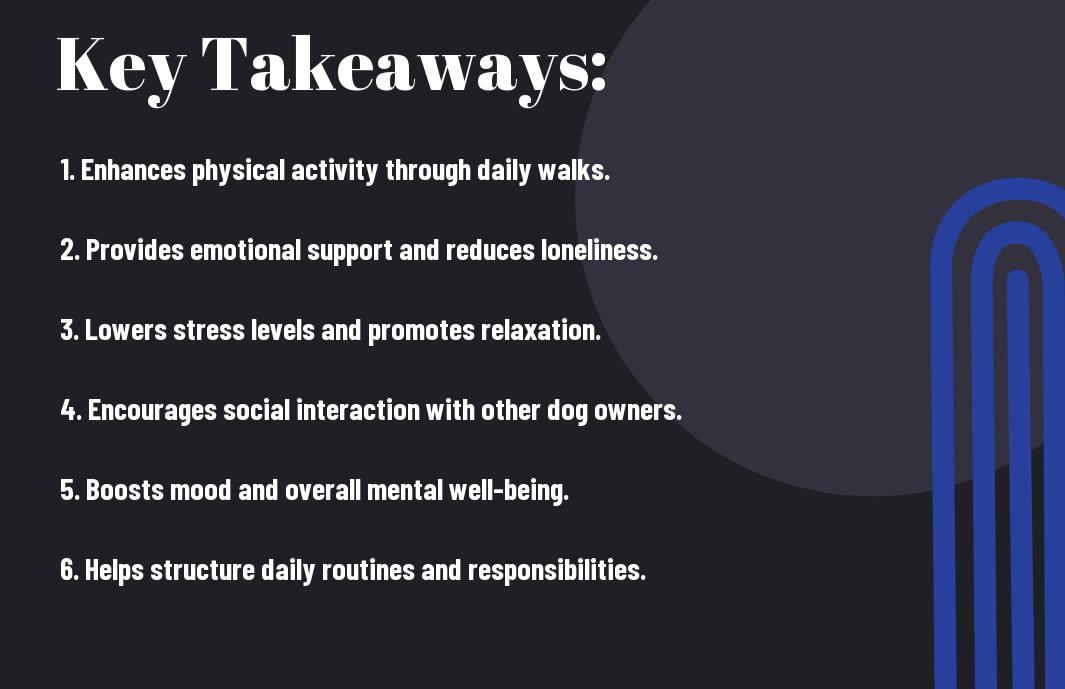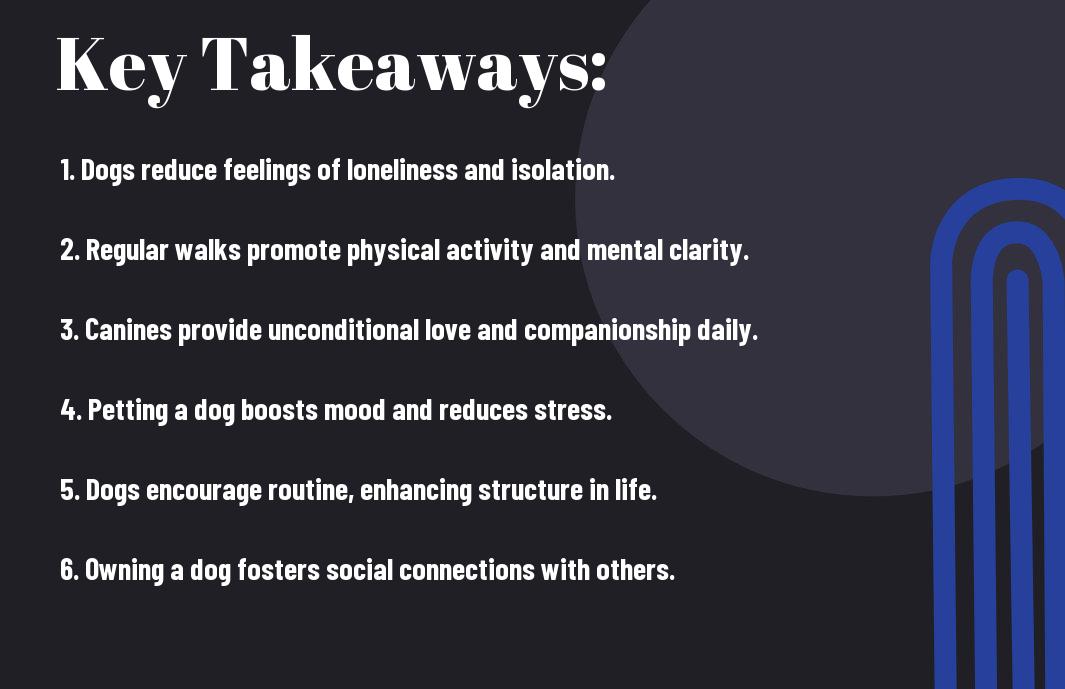You may not realize it, but owning a dog can bring significant health advantages to your life. From lower stress levels to increased physical activity, your furry companion can dramatically enhance your overall well-being. Studies show that having a dog can lead to lower blood pressure, improved heart health, and increased feelings of happiness and companionship. By understanding these benefits, you’ll appreciate how your dog can positively impact your physical, mental, and emotional health in various ways.

Physical Health Benefits
Before you consider adopting a dog, it’s important to understand the myriad of physical health benefits that come with dog ownership. From increased physical activity to improved cardiovascular health, a furry companion can contribute significantly to your overall well-being. Owning a dog is not only about companionship; it also encourages you to stay active and engaged in your health journey.
Increased Physical Activity
Physical activity levels typically surge when you invite a dog into your life. Daily walks, playtime at the park, and engaging in various activities like fetch or agility training inspire you to move more than you might otherwise. This uptick in movement can help you maintain a more active lifestyle, ultimately leading to enhanced physical fitness and healthier muscle function.
Moreover, having a dog typically encourages you to keep a consistent routine. Walking your dog not only provides necessary exercise for them but also for you, creating a beneficial cycle of activity. This regular physical exertion has the dual effect of reinforcing training behaviors in your pet while bolstering your own health.
Improved Cardiovascular Health
Health experts have long identified a link between dog ownership and improved cardiovascular health. Studies suggest that dog owners experience lower blood pressure levels and reduced cholesterol counts, both necessary factors in preventing heart disease. By regularly walking your dog and engaging in physical activities with them, you are inherently nurturing your cardiovascular system through consistent exercise.
But the benefits extend beyond just regular walks. Interacting with a dog can also lower your stress levels, which is another significant contributor to heart health. Reduced stress hormones lead to a relaxed heart, further promoting better cardiovascular outcomes. Additionally, the companionship and emotional support a dog offers can elevate your mood, thus supporting overall heart health.
Enhanced Immune System
On top of promoting physical activity and cardiovascular health, owning a dog can also bolster your immune system. Exposure to the bacteria and microbes that come with owning a pet helps build your immune defenses, allowing your body to better adapt to different pathogens. This is particularly beneficial in households with children, as early exposure to pets has been linked to a decreased risk of allergies and asthma.
Physical contact with your dog, whether through petting or playing, exposes you to various beneficial microorganisms that are necessary for strengthening your immune system. This exposure can create a more balanced gut microbiome, which is crucial for maintaining optimal health and protecting against diseases.
Weight Management
Increased regular physical activity associated with dog ownership plays a significant role in maintaining a healthy weight. As you engage in daily walks, runs, or play sessions, you are intrinsically working towards managing your weight. The companionship of your dog encourages you to be consistent in your physical activities, making it easier to shed extra pounds and maintain a healthy lifestyle.
Moreover, adding the element of fun while walking or playing with your dog can relieve stress, which is often linked to weight gain. An active lifestyle that includes your dog is not only enjoyable but also supports shedding excess weight effectively.
Cardiovascular benefits also contribute to weight management as improved heart health boosts your metabolic rate, ensuring more calories are burned throughout the day. Integrating your dog’s needs with your fitness goals can create a fulfilling program for both of you.
Mental Health Benefits
While the joys of dog ownership are abundant, the mental health benefits you can enjoy are truly remarkable. Dogs have a unique way of providing companionship and emotional support, which can have a profound impact on your overall well-being. As you navigate through life’s challenges, your furry friend can help ease the burden of mental stress and create balance in your everyday life.
Reducing Anxiety and Stress
At the end of a long, stressful day, there’s nothing quite like coming home to a wagging tail and a cuddly companion. Studies have shown that interacting with dogs can significantly lower levels of the stress hormone cortisol, helping to minimize feelings of anxiety. As you pet or play with your dog, your body releases oxytocin—a hormone known for promoting feelings of trust and bonding—thus providing a natural remedy to those anxiety-laden moments.
Moreover, owning a dog can create a structured daily routine that facilitates increased physical activity and fresh air exposure, both of which are necessary for managing stress levels. Taking your dog for a daily walk or engaging in playtime not only strengthens your bond but also redirects your focus away from stressors that might weigh heavily on your mind.
Alleviating Depression
An necessary aspect of owning a dog is how your furry companion can help combat feelings of depression. The mere presence of a dog can offer you a sense of purpose, encouraging you to establish a daily routine that includes walking, feeding, and playing. This sense of responsibility can be a powerful motivator, enabling you to get out of bed and engage with the world around you, which is pivotal for those struggling with depressive thoughts.
Indeed, the unconditional love and loyalty that dogs display provide a source of emotional comfort during tough times. Interacting with your dog can trigger the release of neurotransmitters such as serotonin and dopamine, which are associated with feelings of happiness and satisfaction. This natural uplift in mood may help you cope better with the symptoms of depression.
Promoting Social Interaction
To foster social connections, owning a dog can be incredibly beneficial. Dogs often act as natural icebreakers, making it easier for you to meet new people and engage in conversations. Whether you are at the dog park or simply walking your dog around the neighborhood, your pet can facilitate new friendships with fellow dog lovers, enhancing your social network and providing necessary support and companionship.
Understanding the power of social interaction through dog ownership can significantly improve your mental well-being. By meeting dog owners during walks or trips to the park, you not only increase your chances of forming meaningful relationships but also share in the common experience of caring for a pet, which can lead to deeper connections and mutual support.
Boosting Mood and Happiness
Among the various mental health benefits of dog ownership, the ability to boost your mood and happiness stands out. The small, joyful moments spent with your dog—like belly rubs, playful interactions, or simply cuddling on the couch—can enhance your overall sense of well-being. Positive interactions with your pet help release endorphins, the body’s natural feel-good chemicals, which can elevate your mood and reduce feelings of anxiety and stress.
And, as you invest time and effort into caring for your dog, you build a sense of fulfillment and accomplishment. This relationship not only enriches your life but also creates lasting memories that can be a source of joy in tough times, reinforcing your emotional resilience and encouraging a more positive outlook on life.
Emotional Support and Companionship
Once again, owning a dog can dramatically improve your emotional well-being and create a deeper sense of companionship that many find invaluable. Dogs are known for their unconditional love and loyalty, which can provide a consistency of support that is hard to find elsewhere. As a dog owner, you benefit from the bond that you share with your dog, helping to reduce feelings of anxiety and stress. With a wagging tail and an eager heart, your canine companion is always there to lift your spirits and offer a listening ear.
Unconditional Love and Affection
Affection is one of the most heartwarming aspects of having a dog. They have an innate ability to sense your feelings, often offering comfort during tough times. Whether it’s through a gentle nuzzle or a playful bark, your dog serves as a reminder that you are never alone. This constant source of love can have a profound impact on your mental health, providing you with the emotional grounding that you may sometimes lack.
Furthermore, the affection that your dog shows is unfiltered and genuine. There’s no judgment; just a pure, instinctual bond that fills your home with joy and warmth. This kind of affection fosters a safer emotional environment where you can express yourself freely and feel accepted, reinforcing the sense of companionship that dogs so expertly provide.
Combatting Loneliness
Across the globe, many people experience loneliness, which can lead to serious mental health issues. A dog offers not just companionship, but also a sense of belonging that can significantly reduce these feelings. When you come home to a wagging tail and excited barking, that sense of loneliness fades, reminding you that someone is always waiting for you. The simple act of petting your dog increases serotonin and dopamine levels in your brain, contributing to your overall happiness and emotional stability.
Also, having a dog encourages social interactions, both with your pet and fellow dog owners. You may find that walks at the park or training sessions provide opportunities to connect with others, which further alleviates feelings of isolation. Engaging with your dog in social environments allows you to build relationships that can nourish your spirit and create a support network.
Building Responsibility and Routine
Across all demographics, dogs necessitate a level of discipline and responsibility that can transform your life for the better. Caring for a dog requires you to establish a routine, which is important for keeping both you and your dog healthy. Regular feeding, walking, and playtime create structure in your day, giving you both purpose and direction. This routine becomes integral to your life, helping combat feelings of aimlessness and fostering a sense of accomplishment.
In addition, the responsibility of dog ownership can encourage you to adopt healthier habits. As you commit to taking your dog for daily walks and engaging in physical activities together, you’ll naturally find yourself becoming more active. The positive impact on your physical health will elevate your mood and overall outlook on life, showcasing how owning a dog can become a powerful catalyst for emotional and physical well-being.

Benefits for Children
Keep in mind that owning a dog can be incredibly beneficial for children, providing them with numerous opportunities for growth and development. Having a dog teaches responsibility, as children learn to care for another living being. This experience is particularly valuable in forming strong character traits that can serve them throughout their lives. Moreover, dogs offer unmatched companionship, which fosters a sense of security and encourages children to engage in various activities that can enhance their well-being.
Fostering Empathy and Compassion
One of the most profound benefits of having a dog is how it fosters empathy and compassion in children. When you teach your child how to care for a dog, they inherently learn to recognize and respond to the needs of another creature. This bond encourages children to understand the emotions and experiences of others, promoting a greater sense of kindness and understanding in their everyday interactions.
As they observe their dog’s moods, needs, and expressions, children become more attuned to the feelings of those around them—whether human or animal. This ability to connect emotionally leads to a more balanced and empathetic individual, capable of forming strong relationships throughout their lives.
Promoting an Active Lifestyle
At the same time, having a dog plays a significant role in promoting an active lifestyle for your child. Dogs require regular exercise and interaction, which means you and your child will be more inclined to get outside and engage in physical activities together. This shared commitment to staying active not only benefits your child’s physical health but also provides opportunities for imperative bonding moments.
In fact, studies have shown that children with dogs are more likely to engage in outdoor play and exercise regularly, leading to healthier weight levels and improved cardiovascular health. Incorporating activities like walking, playing fetch, or even just running around in the backyard can help set the foundation for a lifelong appreciation for physical fitness.
Supporting Emotional Development
On another note, having a dog can significantly support your child’s emotional development. The companionship of a dog can provide a source of comfort during challenging times, allowing children to process their feelings in a safe and nurturing environment. This connection can help children learn how to cope with their emotions more effectively and can serve as an outlet for expressing their feelings.
A dog can also help children develop better social skills. Those who grow up with dogs tend to exhibit greater social competence, as the presence of a pet can serve as a bridge in social interactions with peers and adults alike. The joy and laughter that come from engaging with their furry friend translates into increased confidence and better communication skills.
Benefits for the Elderly
All the advantages of owning a dog are particularly pronounced for elderly individuals. Having a furry companion not only provides emotional support but also encourages healthier lifestyle choices that can lead to a more fulfilling life in your golden years.
Encouraging Physical Activity in Seniors
After bringing a dog into your home, you may find yourself more inclined to engage in physical activities. Walking your dog regularly can turn into an enjoyable routine, promoting an active lifestyle that is imperative for maintaining physical health as you age. Simple activities like strolling through the park can help boost your cardiovascular health and increase your overall energy levels.
Moreover, the mere presence of a dog often motivates you to stay active, whether that’s playing fetch in the yard or taking leisurely walks around the neighborhood. This regular movement helps improve balance and mobility, both of which are vital in preventing falls and maintaining independence.
Reducing Feelings of Isolation
On top of encouraging physical activity, owning a dog can significantly reduce feelings of isolation that many elderly individuals face. Dogs are social creatures that offer unconditional love and companionship, helping to bridge the emotional gap created by loneliness. This bond can foster a sense of purpose and belonging that enhances your quality of life.
Encouraging interactions with others is another key benefit of having a dog. When you take your pet for walks or visit dog parks, you are naturally more likely to engage with fellow dog owners and community members. These simple encounters can lead to new friendships and support networks that help combat feelings of loneliness.
Enhancing Cognitive Function
With a dog at your side, you may experience improvements in cognitive function as well. Engaging with your pet through training exercises or playing interactive games challenges your brain, keeping it active and sharp. Research suggests that the responsibility of caring for a dog can also enhance your focus and problem-solving skills, leading to greater mental agility.
But it’s not just about keeping your mind active; owning a dog also provides you with a daily routine, which can be imperative for cognitive health. That routine helps in maintaining structure in your day-to-day life, offering a sense of stability and predictability that can be beneficial in aging.

The Role of Therapy and Service Dogs
After extensive research and countless testimonials, it’s clear that therapy and service dogs play a significant role in enhancing the quality of life for many individuals. These specially trained animals help address a variety of needs, extending their benefits beyond mere companionship. Whether you are dealing with a physical challenge, a mental health issue, or just seeking emotional support, these dogs provide *unmatched* assistance that can help you navigate daily struggles.
Therapeutic Benefits of Service Dogs
Service dogs are trained to perform specific tasks that enable individuals to lead more independent lives. They serve you by providing *physical assistance*, alerting you to potential health crises, or helping with mobility challenges. These dogs can also provide *tactile sensation*, allowing you to navigate through life with a sense of security and support. Their presence can significantly enhance your overall well-being, allowing you to feel more in control and less isolated.
Support for Individuals with Disabilities
Above all, service dogs support individuals with disabilities by performing tasks tailored to their unique needs. These tasks can include retrieving items, guiding visually impaired individuals, or providing stability for those with mobility issues. This *focused assistance* helps reduce the physical and emotional burdens of daily living, fostering a greater sense of independence and dignity. With a trained service dog by your side, you can navigate various environments with renewed confidence.
Therapy dogs also play an crucial role in support for individuals with disabilities, broadening your network of care. They help foster social interactions and encourage communication when you may feel anxious or withdrawn. This connection to your environment can be transformative, as it helps you build relationships and feel more engaged in community activities, leading to improved overall well-being.
The Impact on Mental Health
Across multiple studies, the presence of therapy dogs has shown a positive impact on mental health. These dogs provide *emotional support* that can help ease feelings of anxiety and depression, creating a safe space for you to express yourself. Simply petting a dog can release *feel-good hormones*, reducing stress levels and increasing feelings of happiness. In many cases, they can serve as motivators for you to get out of the house and engage with others, cultivating a sense of community.
Additionally, therapy dogs can help you develop coping strategies and resilience in the face of adversity. They offer a non-judgmental presence that allows you to process your feelings without fear of stigma, making it easier to address your mental health challenges head-on. This dialogue can be instrumental in your journey toward recovery and healing.
Therapeutic dogs make *tangible improvements* to mental health outcomes, emphasizing the importance of companionship in your life. The *bond* developed with these animals can enhance feelings of safety and trust, enabling you to face life’s challenges with a renewed sense of strength and hope.
Final Words
Upon reflecting on the health benefits of owning a dog, it’s clear that inviting a furry companion into your home can significantly enhance your overall well-being. You may find yourself enjoying increased physical activity, as daily walks and playtime with your dog encourage you to stay moving. Furthermore, the simple act of petting your dog can reduce stress levels and promote relaxation, allowing you to experience a more balanced emotional state. The unconditional love and companionship that dogs offer can greatly improve your mental health, making you feel less isolated and more connected to the world around you.
In embracing the responsibility of dog ownership, you are not only enriching your life but also investing in your health. The routine and structure that come with pet care can lead to better habits and accountability, making it easier for you to establish a balanced lifestyle. As you bond with your canine companion, you’ll likely experience increased happiness and fulfillment, benefiting both your physical and emotional health. Ultimately, sharing your life with a dog can foster a sense of purpose and joy that significantly enhances your daily existence.
Q: How can owning a dog improve my physical health?
A: Owning a dog generally leads to increased physical activity levels. Dog owners tend to engage in regular walking, playing, and spending time outdoors, which contributes to overall fitness. Having a dog encourages daily exercise routines that can lower blood pressure, improve cardiovascular health, and maintain a healthy weight. Additionally, the companionship of a dog can help combat obesity and sedentary lifestyles, promoting an active and healthy lifestyle.
Q: In what ways does dog ownership benefit mental health?
A: Having a dog can significantly enhance mental well-being. The presence of a dog often reduces feelings of loneliness and depression, as they provide companionship and unconditional love. Interacting with dogs can release feel-good hormones like oxytocin, which can improve mood and reduce stress levels. Moreover, the routine of caring for a dog can establish a sense of purpose, helping individuals cope with anxiety and emotional challenges.
Q: Can owning a dog have social benefits?
A: Yes, dog ownership can enhance social interactions and relationships. Dogs often serve as social catalysts, making it easier for their owners to meet new people in parks, dog training classes, and other community activities. These social connections can lead to friendships, support networks, and a greater sense of community. Additionally, the shared interest in dogs often creates bonds between fellow dog owners and provides a platform for social engagement.









